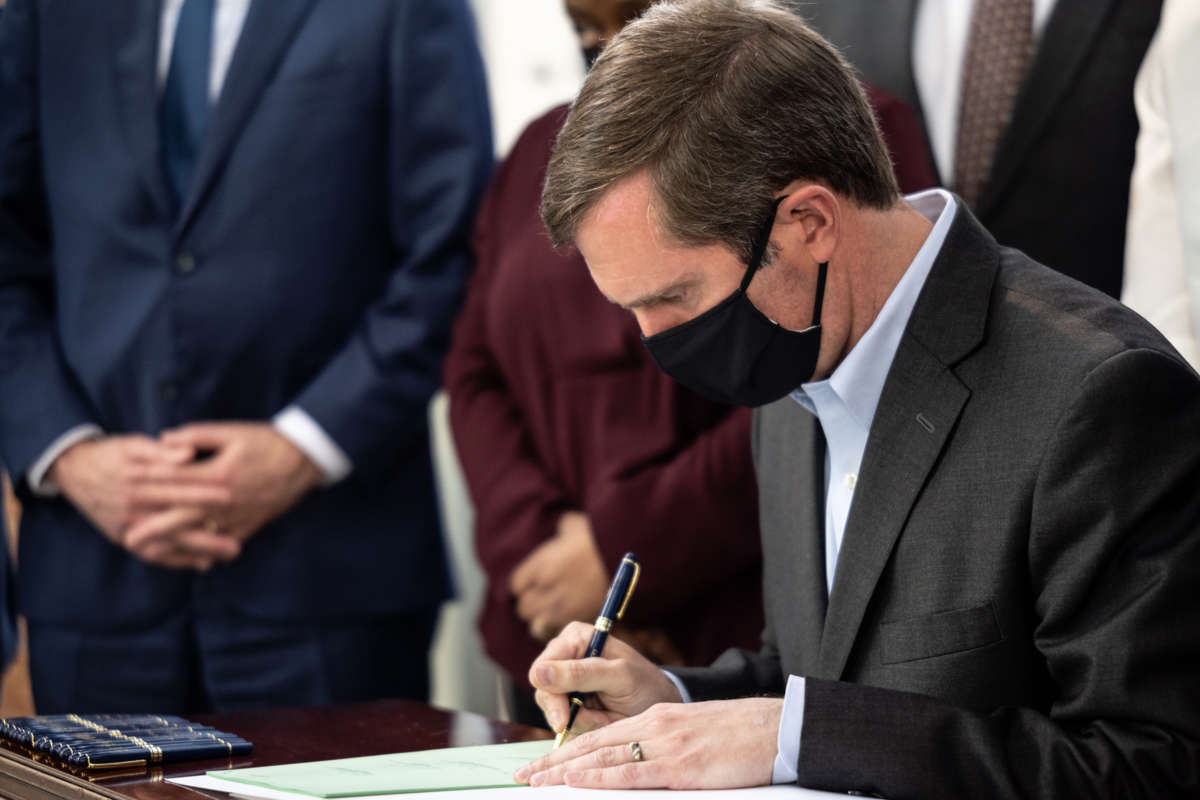Republican lawmakers nationwide have introduced a record number of bills this year to limit access to the ballot and give the GOP an advantage in future elections — 361 voter suppression bills in all, according to data from the Brennan Center for Justice. Many of these bills have been introduced in Southern states including Alabama, Arkansas, Florida, Georgia, Kentucky, Mississippi, North Carolina, South Carolina, Texas, and Virginia. The proposals would among other things implement stricter voter ID requirements, limit absentee voting, make voter registration more difficult, and allow aggressive voter roll purges.
Some of these measures have already become law. In Georgia, for example, Gov. Brian Kemp (R) last month signed into law a bill that erects new barriers to voting, including a photo ID requirement to vote absentee by mail, a narrower window of time for people to request an absentee ballot, and limits on the number of ballot drop-off boxes. The Georgia law even goes so far as to make it illegal for advocacy groups to give water or food to people waiting in long lines to vote.
But at the same time, Democratic state lawmakers are working to expand democracy through legislation. Lawmakers in 47 states have introduced, prefiled, or carried over 843 bills to expand voting access, including in the same 10 Southern states where restrictive voting bills were introduced.
“More than a third of the expansive bills address absentee voting, while more than a fifth seek to ease voter registration,” according to a Brennan Center analysis. “State lawmakers are also focusing on expanding access to early voting and restoring voting rights to people with past convictions.”
Some of the pro-democracy proposals are coming out of states with a long history of voter suppression. In deep red Mississippi, for example, Democratic lawmakers have introduced 12 bills to expand or restore voting rights. In Texas, also under GOP control, they’ve introduced 67.
And in Virginia, the Democratic-controlled legislature recently passed House Bill 1890, the Voting Rights Act of Virginia. The measure is modeled on the groundbreaking federal Voting Rights Act of 1965, which required Justice Department preclearance of voting changes in states with a history of voter discrimination until the U.S. Supreme Court gutted the law in its 2013 Shelby County v. Holder ruling.
“Passing the Voting Rights Act of Virginia — being the first state in the South, the first state that was covered under Section 5 of preclearance to do it — signals to the country that here’s a state that has this dark history. And we are trying to get beyond that,” Tram Nguyen, co-executive director of the progressive New Virginia Majority, told The New York Times.
The new law requires local elections administrators to receive approval from the state attorney general for changes like moving voting precincts or elections registrars’ offices, and it allows voters and the attorney general to sue over claims of voter suppression. It also explicitly prohibits any racial discrimination or intimidation related to voting.
“Voting is fundamental to our democracy,” said Gov. Ralph Northam (D), “and this legislation is a model for how states can ensure the integrity of elections and protect the sacred right to vote.”
Since Democrats won control of its legislature in 2019, Virginia has gone from one of the hardest states for voting to one of the easiest, according to a ranking by researchers at Northern Illinois University.
Next door in Kentucky, the Republican-controlled legislature passed a bipartisan measure that mandates three days of no-excuse early voting, ballot drop boxes in every county, and an online portal to register for absentee voting, among other changes aimed at expanding voting. Democratic Gov. Andy Beshear signed it into law earlier this month.
“When much of the country has put in more restrictive laws, Kentucky legislators, Kentucky leaders were able to come together to stand up for democracy and to expand the opportunity for people to vote,” Beshear said at the signing ceremony. Republican lawmakers endorsed the new law, bucking the trend of GOP-led legislatures working to undermine voting access. Jennifer Decker, a first-term Republican legislator who sponsored the new law, has said that changes made to Kentucky’s elections in response to the COVID-19 pandemic helped build bipartisan support for her proposal.
And in North Carolina, a state that has been at the center of struggles over voting rights in recent years, Democratic lawmakers in the Republican-controlled General Assembly have introduced a sweeping package of election reform proposals titled the Fix Our Democracy Act to expand and protect voting rights for all, end partisan and racial gerrymandering, reduce the influence of big money in politics, increase transparency and accountability in state government, and ensure fair and impartial courts. It was inspired by the far-reaching H.R. 1 federal election reform proposal titled the “For the People Act,” which has passed the Democratic-controlled House and now awaits action in the evenly divided Senate. The North Carolina measure has been referred to the Committee on Rules and Operations of the Senate.
“It’s about time we make the promise of democracy real for all North Carolinians and restore trust in our elections,” wrote Melissa Price Kromm, director of North Carolina Voters for Clean Elections Coalition, in an op-ed for The News & Observer of Raleigh. “North Carolinians won’t always see eye-to-eye on politics, but we can all agree that it should be us choosing our government, not anonymous donors or powerful corporate interests.”
Media that fights fascism
Truthout is funded almost entirely by readers — that’s why we can speak truth to power and cut against the mainstream narrative. But independent journalists at Truthout face mounting political repression under Trump.
We rely on your support to survive McCarthyist censorship. Please make a tax-deductible one-time or monthly donation.
